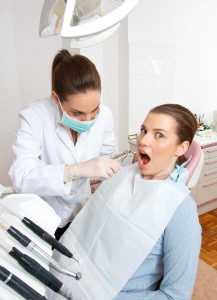Fear of the Dentist: Dental Phobia Worse in Women
Image via Shutterstock.
Who's afraid of the dentist? Be honest now, this is a no-judgement zone. If you answered yes to that question, don't worry – you're not alone. Data from a study conducted by the UK Adult Dental Health Survey showed that almost 50% of adults showed a moderate to extreme fear of the dentist. As part of their study, researchers showed patients pictures of dental treatment scenes – female patients who were scared of the dentist were six times more likely to show signs of disgust at what they saw, compared with non-dental-phobic women.
In Australia, the prevalence of high dental fear (otherwise known as odontophobia) is 16.1%, and this figure is raised for women (20.9%), especially the middle-aged of both genders (22.4%).
Dental fear may be what is delaying your next trip at the dentist – but you shouldn't let it. Now that today's dentists are more aware of their patients' feelings and fears and deal with this using a combination of kindness and gentleness. There are even specialist dentists that deal primarily with people with varying levels of dental fear.
Remember to voice your fears as best as you can instead of sitting silently. Arrange a signal before a treatment begins that will let the dentist know that you need a break. Gaining control in a situation you once felt vulnerable in will help in easing your anxiety and aid in growing confidence. If you feel like none of these techniques will help, speak to your dentist before you get in the chair, and they will find a method that suits your needs best.
Those who get anxious about visiting the dentist are more likely to have poorer oral health than those who get regular checkups. It's best for you to visit the dentist regularly to catch any problems while they're still small and relatively harmless – meaning that treatment is also generally small and relatively harmless, too. You know the old saying – prevention is better than a cure - and in this case, it's true.


